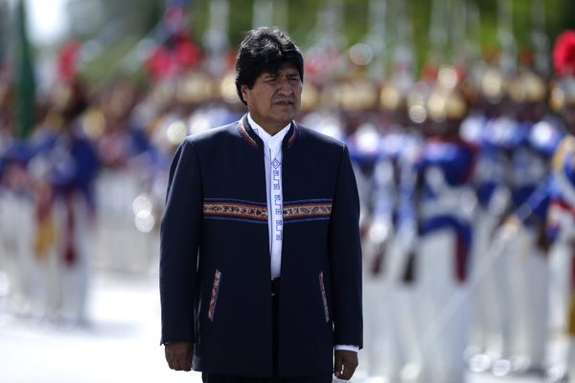
Love Scandal May Doom Bolivian Leader's Push for a Fourth Term
February 17, 2016 - NY Times
Editorial Observer
By ERNESTO LONDOÑO
LA PAZ, Bolivia — Shortly after President Evo Morales of Bolivia quashed rumors last month that he had shelled out $200 for haircuts, a more serious allegation has transfixed the country, one of the poorest in South America, and now threatens his bid for a fourth term.
A Bolivian journalist reported that Mr. Morales, 56, who is single and has closely guarded his personal life, had a child with a young woman, Gabriela Zapata, in 2007, the year after he took office.
The journalist, Carlos Valverde, said the relationship would not be considered a scandal if not for the evidence he had that suggested Ms. Zapata has profited handsomely from her ties to the president. She is a senior executive at a Chinese company the Bolivian state has awarded contracts worth more than $500 million. Photos of her luxurious house have started circulating online.
The scandal comes at a particularly bad time for Mr. Morales, the country's first indigenous president. Bolivians will vote in a referendum on Sunday to decide on a constitutional change that would allow Mr. Morales to seek a new term in 2019. His supporters hail him as a transformative leader who has empowered the country's long-marginalized indigenous community, sharply reduced poverty and narrowed the country's inequality gap.
Critics, though, see him as an increasingly authoritarian leader who has forced critics into exile and used the government's coffers to co-opt rivals and reward his loyalists.
Mr. Morales and his team remained silent for a few days after the report about his relationship with Ms. Zapata. Then, on Feb. 5, he admitted that he and Ms. Zapata started dating in 2005 and had a child in 2007, who, as "bad luck" would have it, he said, died shortly after birth.
"After 2007, I cut all ties," he said. He had no idea, he added, that Ms. Zapata wound up working at China CAMC Engineering Company.
Yet ANF, a Bolivian news agency, published a picture taken last year in which Mr. Morales and Ms. Zapata, 29, appear embracing and smiling at a carnival celebration.
The photo was real, Mr. Morales acknowledged later, but he decided to stick to his story. "I remember, there was a woman with a familiar face who approached me to take a photo during carnival, that's true," Mr. Morales told reporters. "It was a familiar face and when the photo emerged, ah!, I think that's Gabriela."
Mr. Morales has dismissed the corruption allegations as a desperate ploy by the political opposition. "The right, led by the United States, has resorted to a dirty war," he said in an interview on Monday. "Because they have nothing to offer, they wage a dirty war."
On Monday night Mr. Morales said he was considering expelling Peter Brennan, the top American diplomat in La Paz, for allegedly feeding the inflammatory information to Mr. Valverde. The embassy and the journalist have called that accusation unfounded.
Few here seem to believe Mr. Morales. Press coverage has ranged from skeptical to mocking. "There has been trafficking of influence," Paola Valdivieso, a radio journalist, said in an interview shortly after she had challenged Mr. Morales's version of events on air. "There is no doubt."
Some Bolivians say they are willing to turn a blind eye to the corruption allegations because they take for granted that all politicians are corrupt and see Mr. Morales as a champion of the poor.
But many, including people who eagerly voted for him in the past, say that his dishonesty in this scandal is one of the reasons they won't support his bid to stay in power until 2025. If the latter sentiment prevails, Bolivia's beleaguered democracy might get a much-needed lift.